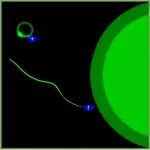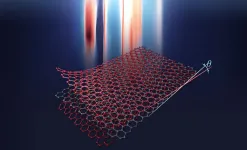Using Artificial Intelligence to prevent harm caused by immunotherapy
Researchers discover biomarkers to identify lung cancer patients who could be made worse by same drugs that helps many others
2021-02-04
(Press-News.org) CLEVELAND--Researchers at Case Western Reserve University, using artificial intelligence (AI) to analyze simple tissue scans, say they have discovered biomarkers that could tell doctors which lung cancer patients might actually get worse from immunotherapy.
Until recently, researchers and oncologists had placed these lung cancer patients into two broad categories: those who would benefit from immunotherapy, and those who likely would not.
But a third category--patients called hyper-progressors who would actually be harmed by immunotherapy, including a shortened lifespan after treatment--has begun to emerge, said Pranjal Vaidya, a PhD student in biomedical engineering and researcher at the university's Center for Computational Imaging and Personalized Diagnostics (CCIPD).
"This is a significant subset of patients who should potentially avoid immunotherapy entirely," said Vaidya, first author on a 2020 paper announcing the findings in the Journal for Immunotherapy of Cancer. "Eventually, we would want this to be integrated into clinical settings, so that the doctors would have all the information needed to make the call for each individual patient."
Ongoing research into immunotherapy
Currently, only about 20% of all cancer patients will actually benefit from immunotherapy, a treatment that differs from chemotherapy in that it uses drugs to help the immune system fight cancer, while chemotherapy uses drugs to directly kill cancer cells, according to the National Cancer Institute.
The CCIPD, led by Anant Madabhushi, Donnell Institute Professor of Biomedical Engineering, has become a global leader in the detection, diagnosis and characterization of various cancers and other diseases by meshing medical imaging, machine learning and AI.
This new work follows other recent research by CCIPD scientists which has demonstrated that AI and machine learning can be used to predict which lung cancer patients will benefit from immunotherapy.
In this and previous research, scientists from Case Western Reserve and Cleveland Clinic essentially teach computers to seek and identify patterns in CT scans taken when lung cancer is first diagnosed to reveal information that could have been useful if known before treatment.
And while many cancer patients have benefitted from immunotherapy, researchers are seeking a better way to identify who would mostly likely respond to those treatments.
"This is an important finding because it shows that radiomic patterns from routine CT scans are able to discern three kinds of response in lung cancer patients undergoing immunotherapy treatment--responders, non-responders and the hyper-progressors," said Madabhushi, senior author of the study.
"There are currently no validated biomarkers to distinguish this subset of high risk patients that not only don't benefit from immunotherapy but may in fact develop rapid acceleration of disease on treatment," said Pradnya Patil, MD, FACP, associate staff at Taussig Cancer Institute, Cleveland Clinic, and study author.
"Analysis of radiomic features on pre-treatment routinely performed scans could provide a non-invasive means to identify these patients," Patil said. "This could prove to be an invaluable tool for treating clinicians while determining optimal systemic therapy for their patients with advanced non- small cell lung cancer."
Information outside the tumor
As with other previous cancer research at the CCIPD, scientists again found some of the most significant clues to which patients would be harmed by immunotherapy outside the tumor.
"We noticed the radiomic features outside the tumor were more predictive than those inside the tumor, and changes in the blood vessels surrounding the nodule were also more predictive," Vaidya said.
This most recent research was conducted with data collected from 109 patients with non-small cell lung cancer being treated with immunotherapy, she said.
INFORMATION:
Case Western Reserve University is one of the country's leading private research institutions. Located in Cleveland, we offer a unique combination of forward-thinking educational opportunities in an inspiring cultural setting. Our leading-edge faculty engage in teaching and research in a collaborative, hands-on environment. Our nationally recognized programs include arts and sciences, dental medicine, engineering, law, management, medicine, nursing and social work. About 5,100 undergraduate and 6,700 graduate students comprise our student body. Visit case.edu to see how Case Western Reserve thinks beyond the possible.
ELSE PRESS RELEASES FROM THIS DATE:
2021-02-04
PITTSBURGH, Feb. 4, 2021 - Researchers at UPMC Hillman Cancer Center and the National Cancer Institute (NCI) demonstrate that changing the gut microbiome can transform patients with advanced melanoma who never responded to immunotherapy--which has a failure rate of 40% for this type of cancer--into patients who do.
The results of this proof-of-principle phase II clinical trial were published online today in Science. In this study, a team of researchers from UPMC Hillman administered fecal microbiota transplants (FMT) and anti-PD-1 immunotherapy to melanoma patients ...
2021-02-04
Despite living in the same part of the Mojave Desert, and experiencing similar conditions, mammals and birds native to this region experienced fundamentally different exposures to climate warming over the last 100 years, a new study shows; small mammal communities there remained much more stable than birds, in the face of local climate change, it reports. The study presents an integrative approach to understanding the climate vulnerability of biodiversity in rapidly warming regions. Exposure to rising temperature extremes threatens species worldwide. It is expected to push many ever closer toward extinction. Thus, understanding ...
2021-02-04
The soundscapes of the Anthropocene ocean are fundamentally different from those of pre-industrial times, becoming more and more a raucous cacophony as the noise from human activity has grown louder and more prevalent. In a Review, Carlos Duarte and colleagues show how the rapidly changing soundscape of modern oceans impacts marine life worldwide. According to the authors, mitigating these impacts is key to achieving a healthier ocean. From the plangent songs of cetaceans to grinding arctic sea ice, the world's oceans' natural chorus is performed by a vast ensemble of geological (geophony) and biological (biophony) sounds. However, for more than a century, ...
2021-02-04
In February 2001, the first drafts of the human genome were published. In this Special Issue of Science, "Human Genome at 20," an Editorial, a Policy Forum, a series of NextGen Voices Letters and a Perspective explore the complicated legacy of the Human Genome Project (HGP). "Millions of people today have access to their personal genomic information, with direct-to-consumer services and integration with other 'big-data' increasingly commoditizing what was rightly celebrated as a singular achievement in February 2001," writes Science Senior Editor Brad Wible.
An Editorial by Claire Frasier, director of the Institute for Genome Sciences at the University ...
2021-02-04
Iodine plays a bigger role than thought in rapid new particle formation (NPF) in relatively pristine regions of the atmosphere, such as along marine coasts, in the Arctic boundary layer or in the upper free troposphere, according to a new study. The authors say their measurements indicate that iodine oxoacid particle formation can compete with sulfuric acid - another vapor that can form new particles under atmospheric conditions - in pristine atmospheric regions. Tiny particles suspended high in the atmosphere - aerosols - play an essential role in Earth's climate system. Clouds require airborne particles, or cloud condensation nuclei (CCN), ...
2021-02-04
For patients with cancers that do not respond to immunotherapy drugs, adjusting the composition of microorganisms in the intestines--known as the gut microbiome--through the use of stool, or fecal, transplants may help some of these individuals respond to the immunotherapy drugs, a new study suggests. Researchers at the National Cancer Institute (NCI) Center for Cancer Research, part of the National Institutes of Health, conducted the study in collaboration with investigators from UPMC Hillman Cancer Center at the University of Pittsburgh.
In the study, some patients with advanced melanoma who initially did not respond to treatment with an immune checkpoint inhibitor, a type of immunotherapy, did respond to the drug after receiving a transplant ...
2021-02-04
Competition among sperm cells is fierce - they all want to reach the egg cell first to fertilize it. A research team from Berlin now shows in mice that the ability of sperm to move progressively depends on the protein RAC1. Optimal amounts of active protein improve the competitiveness of individual sperm, whereas aberrant activity can cause male infertility.
It is literally a race for life when millions of sperm swim towards the egg cells to fertilize them. But does pure luck decide which sperm succeeds? As it turns out, there are differences in competitiveness between individual sperm. ...
2021-02-04
Berkeley -- In the arid Mojave Desert, small burrowing mammals like the cactus mouse, the kangaroo rat and the white-tailed antelope squirrel are weathering the hotter, drier conditions triggered by climate change much better than their winged counterparts, finds a new study published today in Science.
Over the past century, climate change has continuously nudged the Mojave's searing summer temperatures ever higher, and the blazing heat has taken its toll on the desert's birds. Researchers have documented a collapse in the region's bird populations, likely resulting ...
2021-02-04
Treatment for HIV has improved tremendously over the past 30 years; once a death sentence, the disease is now a manageable lifelong condition in many parts of the world. Life expectancy is about the same as that of individuals without HIV, though patients must adhere to a strict regimen of daily antiretroviral therapy, or the virus will come out of hiding and reactivate. Antiretroviral therapy prevents existing virus from replicating, but it can't eliminate the infection. Many ongoing clinical trials are investigating possible ways to clear HIV infection.
In a study published Feb. 4 in the journal Science, researchers at Washington University School of Medicine in St. Louis have identified a potential way to eradicate ...
2021-02-04
In 2018, the physics world was set ablaze with the discovery that when an ultrathin layer of carbon, called graphene, is stacked and twisted to a "magic angle," that new double layered structure converts into a superconductor, allowing electricity to flow without resistance or energy waste. Now, in a literal twist, Harvard scientists have expanded on that superconducting system by adding a third layer and rotating it, opening the door for continued advancements in graphene-based superconductivity.
The work is described in a new paper in Science and can one day help lead toward superconductors that operate at higher or even close to room temperature. These superconductors are considered the holy grail of condensed matter physics ...
LAST 30 PRESS RELEASES:
[Press-News.org] Using Artificial Intelligence to prevent harm caused by immunotherapy
Researchers discover biomarkers to identify lung cancer patients who could be made worse by same drugs that helps many others


